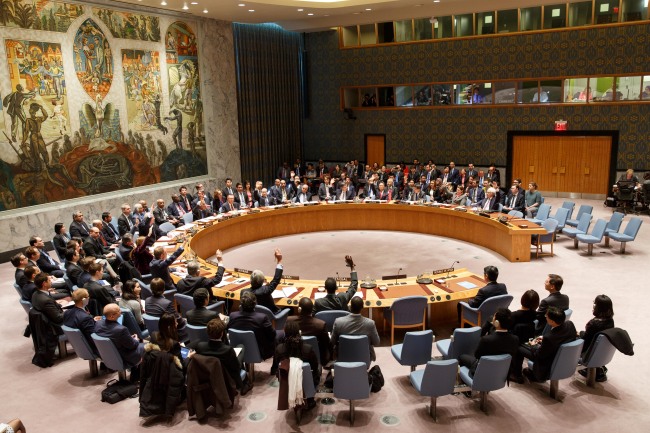The U.N. Security Council adopted a new resolution encompassing strong sanctions against North Korea at midnight on Wednesday, Korean time, following a unanimous vote from the 15 members of the council.
Under the Resolution 2270, the communist country will face what U.S. Ambassador to the U.N. Samantha Power described as “the strongest U.N. sanctions in 20 years.”
Last Thursday, the U.S. revealed the draft resolution encompassing sanctions intended as punitive actions against North Korea’s Jan. 6 nuclear test and Feb. 7 rocket launch. It was on the coattails of China -- the largest trade partner of the North -- finally agreeing to the sanctions after talks with the U.S.

The resolution would require all U.N. member states to inspect all cargo to and from North Korea, whether by land, sea or air, for illicit goods. There is also an arms embargo that requires all countries to expel diplomats from the North engaging in illicit activities, in addition to a ban on exports of all minerals, save for “livelihood purposes.”
Sanctions include banning jet and rocket fuel supplies to the country, grounding North Korean flights suspected of carrying contraband and denying vessels suspected of carrying illicit items access to ports.
In the finance sector, assets of organizations involved in banned activities are required to be frozen, and no branches or subsidiaries of North Korean banks can open in U.N. member states or establish a relationship with financial institutions of the said states. Pyongyang will also banned from exporting coal, iron and other mineral resources, which is a key source of hard currency.
It marked the fifth sanction by the U.N. Security Council against North Korea.
South Korean government welcomed the unanimous adoption, urging the North to denuclearize.
"The resolution adopted today is the expression of the international community's stern will that North Korea's habitual nuclear testing and long-range missile launches will no longer be tolerated, and that its misguided calculations must be changed," said the statement. "We will make all necessary efforts with U.N. member states to ensure that the resolution will be enforced without any problem."
The government vowed to strengthen international cooperation so Pyongayng would abandon its nuclear program in a complete, verifiable and irreversible manner, warning it will face "more serious consequences" in case of another provocation.
U.S. President Barack Obama also welcomed the U.N. sanctions on North Korea, calling it "a firm, united, and appropriate response by the international community" to Kim Jong-un regime’s recent provocations.
"This resolution levies strong new sanctions aimed at halting Pyongyang's efforts to advance its weapons of mass destruction programs," he said. “Today, the international community, speaking with one voice, has sent Pyongyang a simple message: North Korea must abandon these dangerous programs and choose a better path for its people.”
In reaction to the sanctions, the North’s Foreign Minister Ri Su-yong had said that his country will “never be bound” by the resolution and that it would boycott the U.N. Human Rights Council.
The resolution was initially expected to be adopted last week, before Russia requested more time to review the text. The vote was rescheduled again Wednesday after Russia had asked for a 24-hour review.
Russia, one of five permanent council members with veto rights, raised issues with the sanctions over potential damages upon the reclusive country’s legitimate partners and North Korean citizens.
But Moscow’s Ambassador to the U.N. Vladimir Churkin told reporters Tuesday that the U.N. Security Council should adopt the resolution even though it is not “100 percent ideal.”
“This is a resolution which is necessary, which the (U.N.) Security Council should adopt because of certain challenges from North Korea,” Churkin was quoted as saying.
A few revisions at the request of Russia had been made to the draft text before it was finalized.
The comprehensive ban on jet and rocket fuel on all North Korean planes was softened to exclude passenger planes. In addition, a shipment of Russian coal via the North Korean port of Rajin was to be excluded from the sanctions.
The original text had added 17 North Korean individuals and 12 organizations believed to be directly related to nuclear and missile programs to the sanctions blacklist. But the new version excluded Jang Song-chol, North Korean company Korea Mining Development Trading Corp.’s representative in Russia.
Observers said that Russia’s requests were intended to revise sections that could reflect damage to civilian partnerships between the two countries.
“If passenger planes are banned from fueling overseas, it is very difficult to even operate them. ... The general idea of this sanction was to separate the (Kim Jong-un) regime from the North Korea citizens, so that the sanctions would affect the regime,” said Koh You-hwan, North Korea studies professor from Dongguk University.
White House spokesman Josh Earnest stressed that the sanctions is targeted “specifically at the North Korean elite.”
Koh added that Russia’s demand for more time could have been a gesture to reaffirm its influence in the international stage. “The process of drawing up the resolution has been led by the U.S. and China, so it may be Russia’s way of saying ‘I’m still here,’” he said.
Amid rising inter-Korea tensions, the North’s state-run Korea Central News Agency stepped up criticism against President Park Geun-hye on Wednesday by taking issue with the government’s decision to shut down the joint inter-Korean factory complex in Gaeseong and the possible deployment of the U.S.’ Terminal High Altitude Area Defense missile system.
Uriminzokkiri, the North’s main propaganda website, also denounced Seoul’s attempt to pass a bill on North Korean human rights. South Korean parliament passed the long-stalled bill late Wednesday.
By Yoon Min-sik
(minsikyoon@heraldcorp.com)


















![[Today’s K-pop] Treasure to publish magazine for debut anniversary](http://res.heraldm.com/phpwas/restmb_idxmake.php?idx=642&simg=/content/image/2024/07/26/20240726050551_0.jpg&u=)